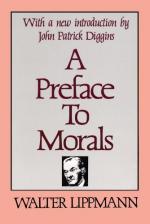|
This section contains 629 words (approx. 2 pages at 400 words per page) |

|
The Industrial Revolution
Lippmann's central argument in A Preface to Morals concerns the status of religion in the "modern age," or the "age of modernity." Lippmann does not define precisely when he considers modernity to have begun but makes broad generalizations regarding historical trends in the West over the past several centuries. However, he frequently makes reference to the changes wrought by the Industrial Revolution, by which many date the coming of the modern age. The Industrial Revolution broadly defines developments that gained momentum in the early nineteenth century, first and foremost in England, which encouraged rural, agrarian economies to become urban, industrial economies.
The Progressive Era
Lippmann's early writing and political thought is frequently associated with the outlook of the Progressive Era in American history. The Progressive movement names a trend in American political activism that began in the 1890s as a response to economic depression in...
|
This section contains 629 words (approx. 2 pages at 400 words per page) |

|




